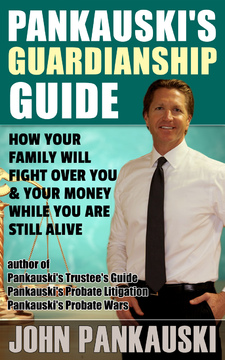How to Fight Guardianship Florida

Regrettably, there are a lot of “contested” guardianships. Every day, it seems, Florida Probate Judges must make difficult decisions. Guardianships have a couple of purposes. First, they determine whether someone needs assistance and protection if they are incapacitated. An aging or afflicted Florida resident may seem fine on the outside. But they may not be able, in the eyes of a judge, to exercise all their rights. They, and their property, money, may need management + protection. Second, guardianships often confirm or appoint someone to take care of that person who is vulnerable. A guardian or a Power of Attorney, or maybe a trustee for just the property. Many times, family members “fight” over who will control mom or dad. And their money. We have previously provided commentary on FLORIDA GUARDIANSHIPS. Now, let’s focus on how to fight guardianship Florida.

Understanding Guardianship Law
There are 4 really important things that you can read for free to understand Florida guardianship law. And learn how to fight Florida Guardianship. First, read the Guardianship Code. Chapter 744 of the Florida Statutes sets forth the law of Florida Guardianship. It can explain the TYPES of guardianships. Many times, people will file a motion or petition for EMERGENCY TEMPORARY GUARDIAN. This often upsets family members who are not given “notice” of this until a judge enters an order. There are also “plenary” guardianships. Or guardianships over just the property. Or, just the person. One of the most important rules is to file an appearance in any guardianship. That way , you will get copies of all guardianship court-filed documents. That helps you understand what’s going on with the case. And knowing that the case is going on will let you file your own motions or petitions. But to participate in a Florida guardianship proceeding, you first need Standing. Standing is a connection you have with the guardianship. Why should you be permitted to participate in someone’s guardianship case? Most family members have standing, but not all. Do ex-spouses have standing? What about adult children? Some of the cases might surprise you. Many times, someone who you think has standing, is ruled to NOT have standing. That means you cannot participate in a guardianship. The 2nd thing you might want to read is THE case about standing in a Florida guardianship. The Florida case is Hayes v. Guardianship of Thompson. The Florida Supreme Court explains the issue of standing in that opinion. The opinion explains how a court determines standing.
Probate Rules
The 3rd thing that you want to read are the Florida Probate Rules. Those rules explain the process and what is needed along the way. It talks about things like hearings, petitions and also inventory of the person’s property. Remember, in Florida, you can have a guardianship over a “person” or his or her “property“. A guardianship over the person means that someone, like a guardian or a Power of Attorney, is appointed to make those personal decisions for the person. Those decisions can include where they live, or what doctors they see, or who they hang out with. If you disagree, then file a motion or a response, and make sure you are present at all court hearings. Otherwise, decisions will be made without your input. A guardian of the property is put in charge of the person’s assets if necessary. They must inventory them, and account for them. To read the statutes on guardian inventories + accountings, click HERE. If a guardianship inventory or accounting is filed, and assets are missing, you need to object. If too much money was spent, you need to file an objection. Many times, there are disagreements over how the person’s property is being handled. File responses and objections. Be heard. One of the most important aspects of a guardianship is whether or not the person has a lesser restrictive alternative to a guardianship that ADEQUATELY addresses their needs. This is where family members might fight over a Power of Attorney or who is trustee of a person’s revocable or living trust. If you don’t believe the POA is proper, you should object. If you believe that the guardian has a conflict of interest, or to read about prohibited actions, click on Fla. Stat. 744.446.
Evidence !
Finally, you should consider reading the Fernandez v. Guardianship of Fernandez case out of Miami. This is a 2010 3rd District Court of Appeal opinion on how guardianship matters should be conducted. With evidence and a procedure. You should know that when a petition for guardianship is filed, they refer to the person who may be incapacitated as the “alleged incapacitated person.” Florida guardianship lawyers refer to this as the “AIP.” If a guardianship is created, the AIP becomes a “Ward.” Guardianships are not “one size fits all”. And the needs of the ward can change over time. There are typically two different cases for guardianships. One is an “MH” case, meaning mental health. In that case, a judge will determine if the AIP is incapacitated or not. Maybe the AIP is not totally incapacitated and can exercise some rights, but not all. And there is a “GA” case or a guardianship case. This proceeding is for the appointment, or not, of a guardian. Or to discuss whether there are alternatives to guardianships. Like POAs and trusts. Take a stand in each one. File an appearance in each case. If you need counsel, consider looking for those limited few who actually try guardianship cases and who regularly handle trials. NOT just hearings and court appearances. (Every lawyer does that.) Many “guardianship” lawyers say that they go to court, but they really don’t try cases. And watch out for those attorneys who want to settle everything. Settlement is up to you, not your attorney. But, not everyone needs or can afford an experienced guardianship trial lawyer. Remember that the law helps those who exercise their rights and take a stand. Silence is assumed to be consent. Generally, the law does not assist those who remain silent and who do not exercise their rights.